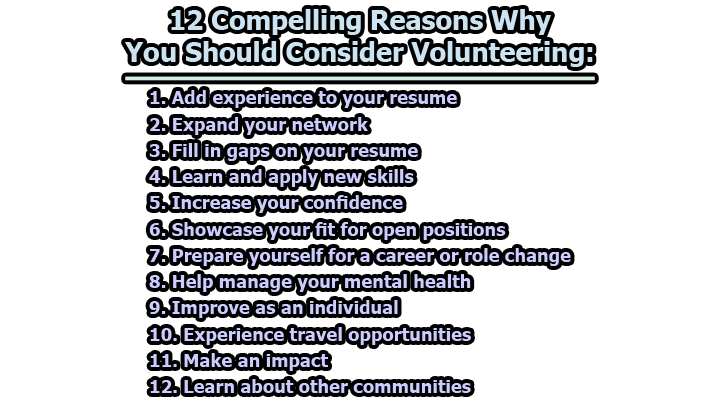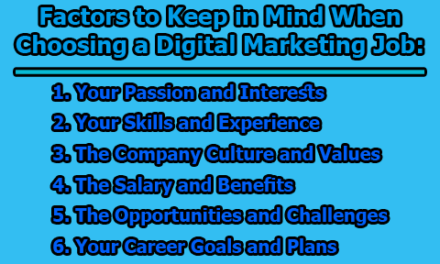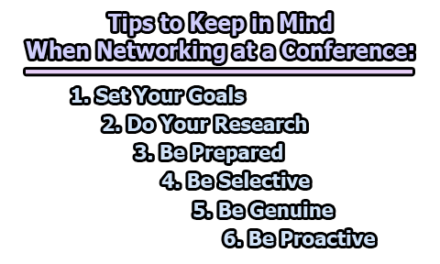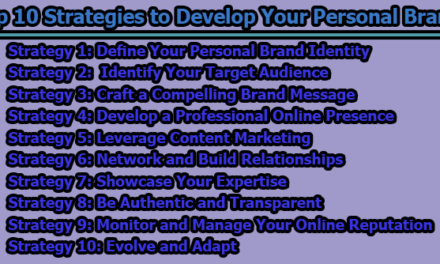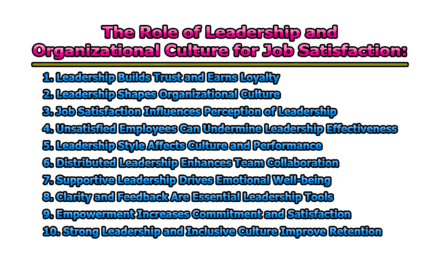12 Compelling Reasons Why You Should Consider Volunteering:
Volunteering is a selfless act that involves dedicating one’s time, skills, and efforts to help others and contribute to the betterment of society. While the primary goal of volunteering is to make a positive impact on communities and individuals in need, it offers numerous personal and professional benefits to the volunteers themselves. In this article, we will explore 12 compelling reasons why you should consider volunteering and how it can enrich your life in various ways.
1. Add experience to your resume: Volunteer work can be a game-changer when it comes to building your resume, especially if you are just starting your career or lack relevant work experience. Employers highly value candidates who have demonstrated a commitment to community service and social responsibility. When you volunteer, you acquire practical skills, such as communication, problem-solving, teamwork, and leadership, which are transferable to various job roles.
Furthermore, volunteer experience shows potential employers that you are proactive and motivated to contribute positively to society beyond just paid work. It also reflects your dedication to personal and professional growth, as volunteering often involves stepping outside your comfort zone and taking on new challenges.
2. Expand your network: Volunteering introduces you to a diverse group of people from various backgrounds, professions, and experiences. These connections can open doors to unexpected opportunities, both professionally and personally. As you collaborate with other volunteers and interact with community members, you build relationships based on shared passions and interests.
Expanding your network through volunteering can lead to informational interviews, job referrals, and recommendations. In addition, many community organizations have ties with local businesses, government agencies, and educational institutions, giving you access to a broader network of potential mentors, employers, and colleagues.
3. Fill in gaps on your resume: Career transitions or periods of unemployment can create gaps in your resume that employers might view with skepticism. Volunteering during these phases demonstrates your commitment to staying active and engaged despite any setbacks. It shows that you were proactive in using your time productively to contribute to causes you believe in.
For example, if you took time off work to raise a family, volunteering with a nonprofit organization can showcase your leadership and organizational skills, keeping you professionally relevant during that period. Similarly, students can volunteer in organizations related to their field of study, gaining hands-on experience and making them more competitive in the job market upon graduation.
4. Learn and apply new skills: Volunteering offers a unique learning environment where you can acquire new skills and put them into practice immediately. For instance, if you are contemplating a career change, volunteering in a relevant field allows you to test the waters and determine if it aligns with your interests and abilities.
Suppose you are transitioning from a technical role to a creative field. In that case, volunteering to design marketing materials or manage social media for a nonprofit organization enables you to build a portfolio and gain experience that will impress potential employers.
5. Increase your confidence: Volunteering can be a transformative experience that boosts your self-confidence and self-esteem. As you actively contribute to positive change in the community, you realize the value of your skills and the impact you can have on others’ lives.
The recognition and gratitude you receive from the people you help, as well as your fellow volunteers, reinforce a sense of accomplishment. This newfound confidence can positively affect various aspects of your life, making you more assertive in interviews, better equipped to handle challenges, and more proactive in pursuing your goals.
6. Showcase your fit for open positions: Volunteering provides a platform to demonstrate your character and work ethic, which are essential qualities for any employee. Employers often seek candidates who can seamlessly integrate into the company’s culture and values. Volunteering experience can vouch for your ability to collaborate, be empathetic, and work diligently.
For example, if a job requires excellent customer service skills, having volunteered at a local library where you interacted with the public showcases your ability to handle customers professionally and efficiently. Hiring managers are more likely to favor candidates who have demonstrated these qualities through their volunteer work.
7. Prepare yourself for a career or role change: Changing careers or seeking advancement within your current field often requires specific experience or skills that you may not have obtained in your regular job. Volunteering allows you to bridge that gap by offering opportunities for skill development and leadership experience.
Taking on leadership roles in volunteer organizations, such as serving on boards or managing projects, equips you with the necessary managerial skills sought after in higher-level positions. These experiences not only bolster your resume but also provide you with valuable stories and examples to share during job interviews.
8. Help manage your mental health: Volunteering can be a form of therapy, benefiting your mental health in numerous ways. Engaging in acts of kindness and helping others triggers the release of endorphins, promoting feelings of happiness and fulfillment. The act of volunteering can shift your focus away from personal worries and stress, providing a sense of purpose and contentment.
Furthermore, connecting with like-minded individuals and being part of a supportive community can alleviate feelings of loneliness and isolation. As a result, volunteering can improve your overall well-being and reduce the risk of anxiety and depression.
9. Improve as an individual: The personal growth that comes with volunteering is immeasurable. Engaging with diverse individuals and communities exposes you to different perspectives, cultures, and ways of life. As you collaborate with other volunteers on projects, you develop essential soft skills, such as communication, empathy, and adaptability.
Volunteering also provides a unique opportunity for self-reflection, allowing you to gain insights into your values, strengths, and areas for growth. This deeper understanding of yourself as an individual can lead to greater self-awareness and improved interpersonal relationships.
10. Experience travel opportunities: Some volunteer opportunities may present travel options, allowing you to explore new places while contributing to meaningful projects. Whether it’s volunteering to build schools in a remote village or assisting with environmental conservation efforts in different countries, these experiences provide a unique blend of cultural immersion and service.
Engaging in ethical and sustainable travel practices, such as respecting local customs and minimizing environmental impact, ensures that your volunteer experience contributes positively to the communities you visit.
11. Make an impact: Perhaps the most rewarding aspect of volunteering is the positive impact you can have on individuals and communities in need. Whether you’re helping to build homes for the homeless, tutoring underprivileged students, or feeding the hungry, your efforts contribute to the betterment of society.
Knowing that your actions directly benefit others and improve their lives can be a powerful motivator. Making a difference, no matter how small, creates a sense of purpose and fulfillment that is unparalleled.
12. Learn about other communities: Volunteering takes you beyond the boundaries of your immediate surroundings and exposes you to new communities, cultures, and ways of life. Immersing yourself in different environments allows you to gain a deeper appreciation for diversity and fosters a spirit of inclusivity.
Understanding how different communities operate and solve challenges provides valuable insights applicable to various areas of life, including personal relationships and professional problem-solving. By broadening your horizons, you become a more open-minded and empathetic individual, capable of navigating a complex and interconnected world.
In conclusion, volunteering offers a myriad of advantages, from enhancing your professional appeal to fostering personal growth and well-being. The act of giving back not only benefits society but also enriches the lives of volunteers themselves. By dedicating your time and skills to meaningful causes, you embark on a journey of self-discovery, create lasting connections, and leave a positive impact on the world around you.
Frequently Asked Questions [FAQs]:
Why should I consider volunteering?
Volunteering offers numerous benefits, both personal and professional. It allows you to gain valuable experience for your resume, expand your network, learn and apply new skills, and increase your confidence. Additionally, volunteering provides a sense of fulfillment and purpose by making a positive impact on communities and individuals in need.
How can volunteering help me in my career?
Volunteering can significantly enhance your career prospects. It provides an opportunity to showcase your skills and commitment to potential employers, making you a more attractive candidate. It also offers chances to network with professionals in your field, gain relevant experience, and fill gaps in your resume during career transitions.
Can volunteering lead to paid job opportunities?
Yes, volunteering can lead to paid job opportunities in several ways. First, it can help you build a strong network that might inform you of job openings. Second, the skills and experience gained through volunteering can make you a more competitive candidate for paid positions. Lastly, some organizations may offer paid positions to their dedicated volunteers.
What types of skills can I learn through volunteering?
Volunteering provides a wide range of skill-building opportunities. You can develop interpersonal skills, leadership abilities, communication, problem-solving, teamwork, time management, and project management skills. Additionally, volunteering can offer industry-specific skills, depending on the type of organization and projects you engage in.
Can volunteering help with personal growth and well-being?
Absolutely! Volunteering has positive effects on personal growth and well-being. It can boost your self-confidence, improve your mental health by reducing stress, anxiety, and depression, and give you a sense of purpose and fulfillment. Engaging with diverse communities and learning about different cultures also fosters empathy and open-mindedness.
How can I find volunteering opportunities?
Finding volunteering opportunities is easier than ever with online platforms and community organizations. You can search websites dedicated to volunteer listings, contact local nonprofit organizations, or inquire with community centers. Social media and networking events are also great places to discover volunteer opportunities.
Is volunteering suitable for people with busy schedules?
Yes, volunteering can be adapted to fit busy schedules. Many organizations offer flexible volunteering options, allowing you to choose the time commitment that works best for you. You can volunteer for short-term projects, one-time events, or contribute your skills remotely, making it accessible for people with various time constraints.
Can volunteering help me change careers?
Volunteering is an excellent way to explore new career paths and gain relevant experience in your desired field. It allows you to test the waters before fully committing to a career change. By volunteering in roles related to your career interests, you can build a portfolio, develop transferable skills, and increase your chances of successfully transitioning into a new career.
What should I consider when choosing a volunteering opportunity?
When selecting a volunteering opportunity, consider your interests, passions, and skills. Choose a cause that resonates with you and aligns with your values. Assess the time commitment required and whether it fits your schedule. Moreover, look for opportunities that offer growth potential, skill development, and networking possibilities.
How can I make the most of my volunteering experience?
To make the most of your volunteering experience, fully engage and immerse yourself in the projects. Take the initiative, seek feedback, and actively collaborate with other volunteers and team members. Keep track of your accomplishments and experiences to update your resume and reference them during job interviews. Lastly, remember that volunteering is about making a difference, so approach it with enthusiasm and a positive attitude.

Library Lecturer at Nurul Amin Degree College

